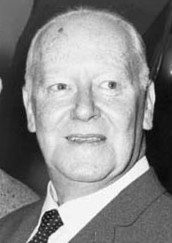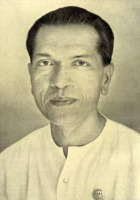
Alec Derwent Hope was an Australian poet and essayist known for his satirical slant. He was also a critic, teacher and academic. He was referred to in an American journal as "the 20th century's greatest 18th-century poet".
Arthur Yvor Winters was an American poet and literary critic.

Kenneth Adolphe Slessor was an Australian poet, journalist and official war correspondent in World War II. He was one of Australia's leading poets, notable particularly for the absorption of modernist influences into Australian poetry. The Kenneth Slessor Prize for Poetry is named after him.

Dame Mary Jean Gilmore was an Australian writer and journalist known for her prolific contributions to Australian literature and the broader national discourse. She wrote both prose and poetry.
Vivian Brian Smith is an Australian poet. He is considered one of the most lyrical and observant Australian poets of his generation.

Ian Mayelston Mudie was an Australian poet and author.
Frank Leslie Thomson Wilmot, who published his work under the pseudonym Furnley Maurice, was a noted Australian poet, best known for To God: From the Warring Nations (1917).
Douglas Stewart was a major twentieth century Australian poet, as well as short story writer, essayist and literary editor. He published 13 collections of poetry, 5 verse plays, including the well-known Fire on the Snow, many short stories and critical essays, and biographies of Norman Lindsay and Kenneth Slessor. He also edited several poetry anthologies.
David Gordon Brooks is an Australian poet, novelist, short-fiction writer and essayist. He is the author of four published novels, four collections of short stories and five collections of poetry, and his work has won or been shortlisted for major prizes. Brooks is a highly intellectual writer, and his fiction has drawn frequent comparison with the writers Italo Calvino and Jorge Luis Borges.

Tribhuvandas Purushottamdas Luhar, better known by his pen name Sundaram,, was a Gujarati poet and author from India.
"Bell-Birds" is a poem by Australian writer Henry Kendall that was first published in The Sydney Morning Herald on 25 November 1867.
"The Last of His Tribe" is a poem by Australian writer Henry Kendall that was first published in The Sydney Morning Herald on 27 September 1864, under the title "Woonoona: The Last of His Tribe".
"Bill the Bullock Driver" is a poem by Australian writer Henry Kendall that was first published in The Australian Town and Country Journal on 1 April 1876.
"The Song of Ninian Melville" is a poem by Australian writer Henry Kendall that was first published in the author's suppressed edition of his poetry collection, Songs from the Mountains in 1880. The poem is a set of verses satirising Ninian Melville, at that time Member for Northumberland in the Parliament of New South Wales. Immediately after publication the publisher, believing the political satire to be possibly libellous, recalled the edition after some 250 copies had been distributed. The satire was excised and replaced by the poem "Christmas Creek". The book was re-published in January 1881.
This article presents a list of the historical events and publications of Australian literature during 1953.
This article presents a list of the historical events and publications of Australian literature during 1957.
This article presents a list of the historical events and publications of Australian literature during 1963.
Valentine Thomas Vallis (1916–2009) was a Queensland poet, lecturer and opera critic.
"A Death in the Bush" (1868) is a long narrative poem by Australian poet Henry Kendall. It was originally published in the 1868 edition of Williams's Illustrated Australian Annual, and later appeared in the author's collection Leaves from Australian Forests (1869).
Stephen Kenneth Kelen, known as S. K. Kelen, is an Australian poet and educator. S. K. Kelen began publishing poetry in 1973, when he won a Poetry Australia contest for young poets and several of his poems were published in that journal.




